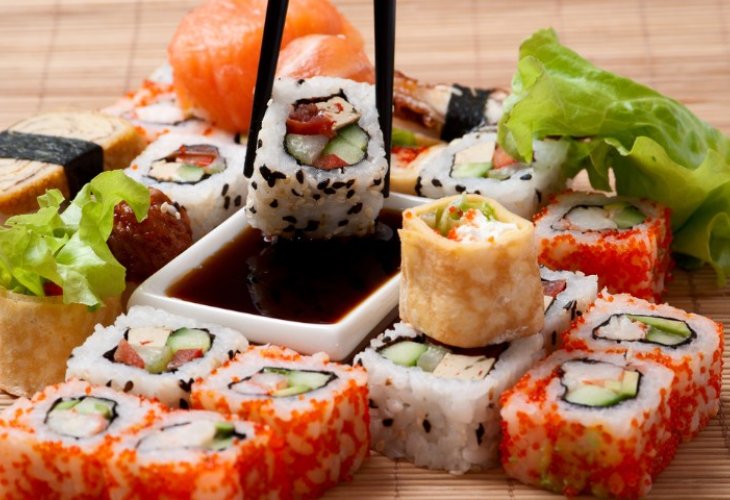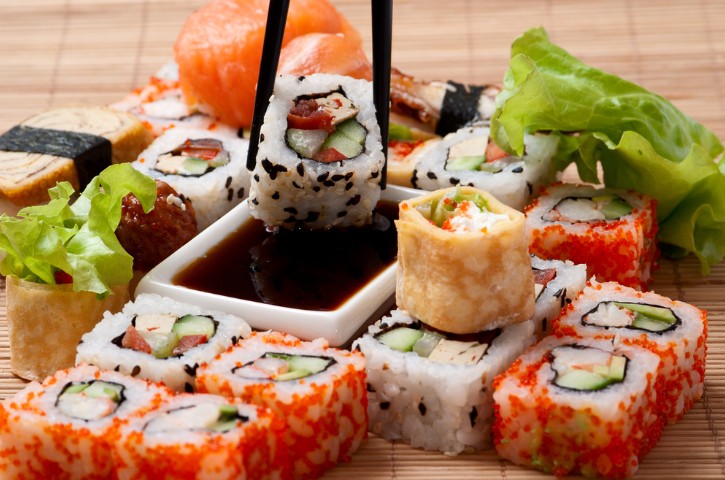Kosher in Asian Restaurants: What to Watch Out For?
Sushi, kombu soup, wakame salad: The Asian menu is rich in seaweed. But few know that eating seaweed poses serious kashrut issues. Additionally, cooking in these restaurants is often done by non-Jews. Important information for the public who adheres to kashrut according to Maran Beit Yosef

Usually, when we sit in an Asian restaurant, we don't understand most of the menu names, and certainly don't know what they're made of.
For example, if we're offered an appetizer of miso soup with chop suey noodles, and for the main course, tempura chicken with wasabi paste in teriyaki sauce, served with a giant tofu salad on a bed of wakame, and for dessert...
Actually, why tire you out? The list of terms is very long and requires a lot of knowledge: what each product is made of, and especially how to handle it, because as we know, in most Asian restaurants, even kosher ones, those preparing our food are non-Jews who know or have learned to work with the hot wok and are skilled in seasoning and stir-frying. Therefore, those who strictly adhere to bishul Yisrael (food cooked by Jews) according to Maran Beit Yosef cannot enjoy these meals.
There is another kashrut problem in these restaurants, related to one of the fundamental ingredients on which the restaurant is based: seaweed. You can't have an Asian menu without sushi, or kombu soup and wakame salad, which are different types of seaweed.
Seaweeds are water growths, growing mostly in the open sea, or alternatively in artificial pools. Some seaweeds are actually classified as bacteria, like blue-green algae, and some as plants, like green algae. The ones we're more familiar with, used for nori seaweed or wakame and kombu, are red and brown algae, which look like water plants but are completely different from them.
While plants draw their nourishment from the soil through their roots, seaweeds lack roots and mainly feed on light. Today, seaweed cultivation is done artificially, by sowing red algae seeds inside shells, and after the seeds have sprouted, connecting them to long nets hanging on poles, which are fixed in salty seawater. The growing site is close to the shoreline, and care is taken that the "plantation" is in a place where the sea has high and low tides, in order to use the low tide to expose the seaweed to light, and on the other hand to use the high tide so that the seaweed can develop.

But this method creates the major problem with seaweed, since coastal seawater is full of crabs and other types of non-kosher creatures, and when the seawater recedes due to low tide, all kinds of non-kosher animals get trapped in the tangles of the leaves, so that even after the seaweed is harvested, there is still a reasonable and common concern that they contain non-kosher animals.
But there is a fundamental difference between types of seaweed and their preparation for eating. This time, we'll focus on wakame seaweed.
The wakame seaweed marketed to us comes dried, resembling black tea leaves, but in slightly larger flakes. Amazingly, after soaking in lukewarm water for a few minutes, the flakes open up into strips about four or even five to six centimeters in size, and take on a new shape more reminiscent of chopped lettuce salad. However, just as lettuce is problematic and requires special supervision and cultivation, so too with wakame... Within the folds of the leaf, and even in non-hiding places, unidentified objects of a lighter color rest, visible to the naked eye without aids. Upon closer inspection, they are revealed to be creatures with legs and antennae... which are absolutely forbidden to eat.
True, it's very possible that the packaging will bear a kosher certification, usually from overseas kashrus agencies, but this is no guarantee at all. Their intention is that the body of the leaves is kosher and made of completely natural materials, but using it requires thorough inspection.
Indeed, some time ago, several businesses approached the inspectors of the Badatz Beit Yosef, requesting permission to use wakame seaweed, as is permitted in several other places, and of course, after the seaweed undergoes soaking and thorough washing in soapy water. For this purpose, Rabbi Menachem Katchvilli, a Badatz inspector and one of the greatest experts today, who also coordinates the field of infestations and worms, set out to investigate and practically examine how wakame seaweed could be used. For this purpose, he collected samples from several companies and brands, from different importers, and began the examination process. Initially, he lightly rinsed the wakame to get an indication of the level of washing needed for these seaweeds, and the findings were horrifying. There was no company type that didn't have infestations, and not just remains of vermin, but one could clearly see whole crab bodies, which intensify the problem, since we hold that a whole creature is considered a complete entity that is never nullified, not even in a thousand... Although this doesn't matter much, because even a piece of a vermin is considered to stand on its own and is recognizable on the seaweed, so it's not considered a mixture that can be nullified.
But our expert wasn't satisfied with this and conducted another wash, this time thorough, and infestations were found in this too. He had naively thought that if he instructed to wash several times, with a strong wash, and perhaps also with scrubbing in soapy water, the seaweed would be at a reasonable level, but he was disappointed in this too. Even in the third wash, infestations were still found, so for now there is no way to permit wakame with the regular washing methods used for other supervised leafy vegetables...
Interestingly, kombu seaweed, which looks like dried green strips, was found to be cleaner, so it can be prepared after soaking for a long time in water until properly softened and opened, and only then scrubbed and washed well under running water.
For concerns about non-Jewish cooking in shawarma shops, see the article: "Where is it permissible to buy shawarma".

